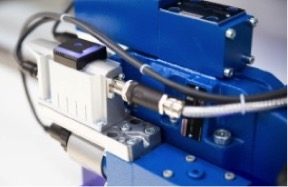Bosch Rexroth Introduces New Digital On-Board Electronics

With the newly developed generation of digital on-board electronics for hydraulics, Rexroth allows economical scaling between analog components and those with a fieldbus/Ethernet connection. It takes advantage of the economic benefits of digitalization with no additional cabling. The new generation provides the open interfaces Bluetooth and IO-Link. In conjunction with a suitable app, commissioning engineers, operators and service technicians can access components and change parameters using their smartphone – directly and independently of the machine control system.
The first components to feature the new digital on-board electronics are the new proportional pressure regulating valves. In terms of hardware, they offer improvements thanks to volume flow-independent pressure regulation and a linear command value-pressure characteristic curve with four pressure levels. The valves have an integrated pressure sensor as well as a connection for external pressure sensors.
During initial commissioning, the components identify themselves via their digital name plate and, after a few moments, the technicians can start the parametrization process via their smartphones. An LED lights up blue during the connection and shows the commissioning engineer which proportional pressure reduction valve they are currently connected to.
Commissioning engineers can select from Rexroth’s predefined parameter sets or define them themselves. They can then save them and transfer them to identical valves. The app’s new patented slider makes optimization even easier. When the slider is moved between “Moderate” and “Aggressive”, the app’s software automatically adjusts all corresponding parameters to the selected dynamics.
For end users, the new digital on-board electronics significantly increases flexibility for process changes. If for example a tool which is twice as heavy is used on a press, a different valve would often have to be used on previous machines. With the new generation, it is sufficient to bring up the app in order to adjust the parameters accordingly. As a result, the end user can save the money needed for a conversion and the resulting machine downtime is avoided.
In addition, end users can use condition monitoring with no additional outlay. Via the app, they call up operating data such as the temperature or operating hours using the Diagnostics button. This helps to prevent nasty surprises. Via IO-Link, users can automatically set up this status monitoring in the machine control system too. Condition monitoring extends the operating life of components and increases availability.





